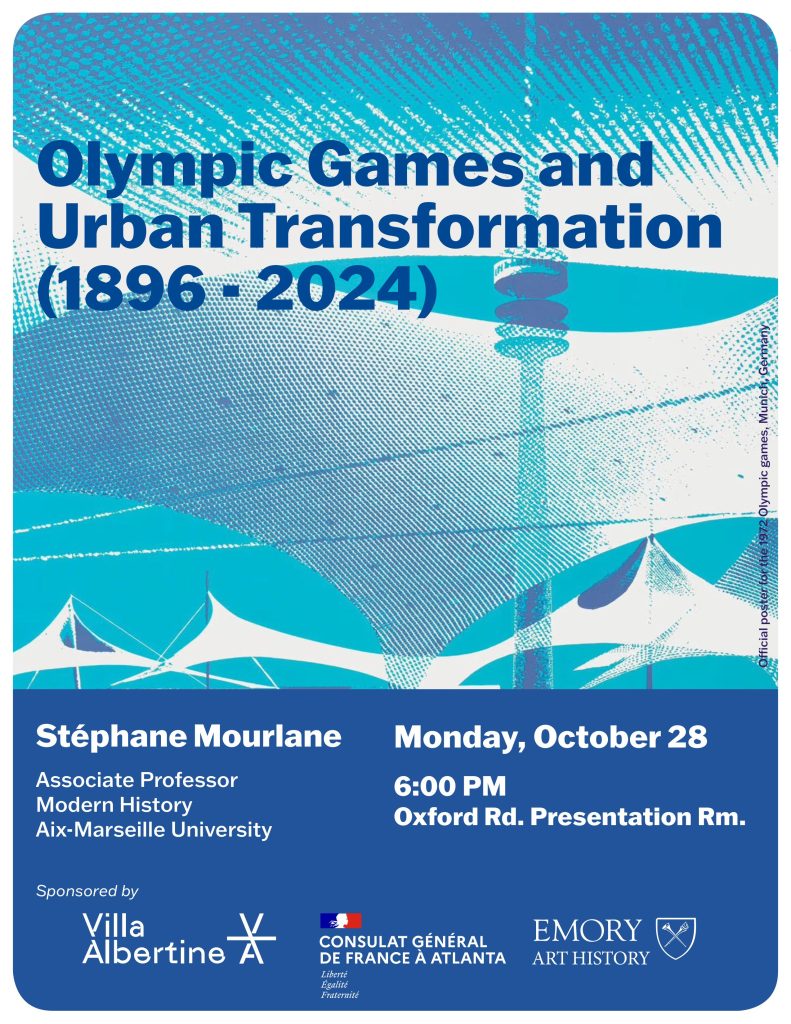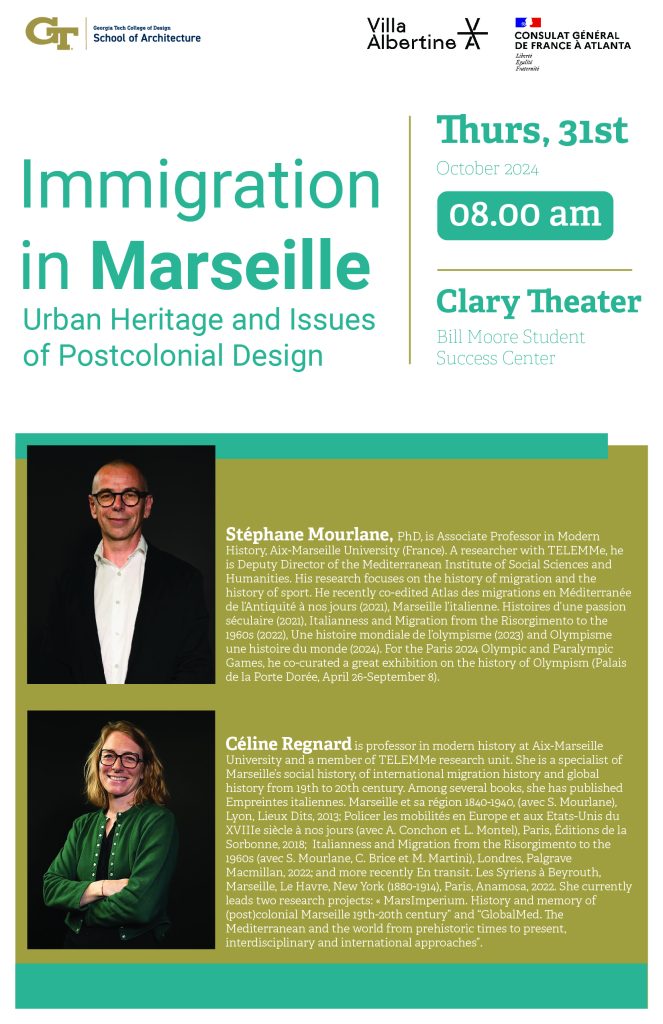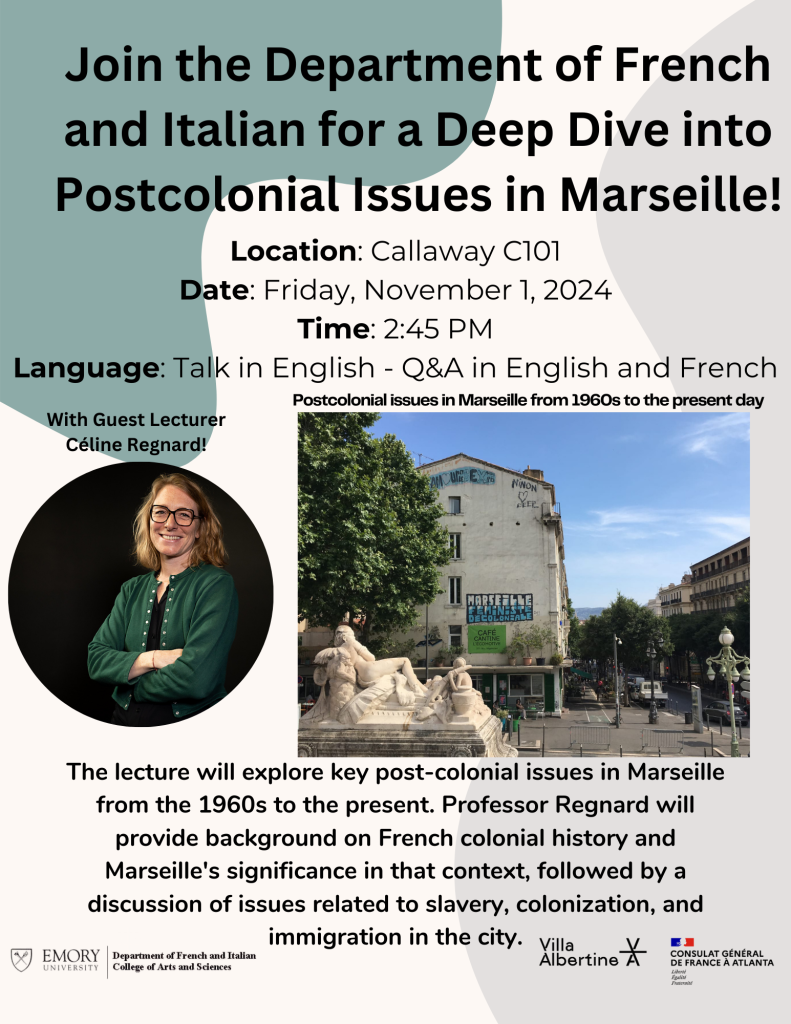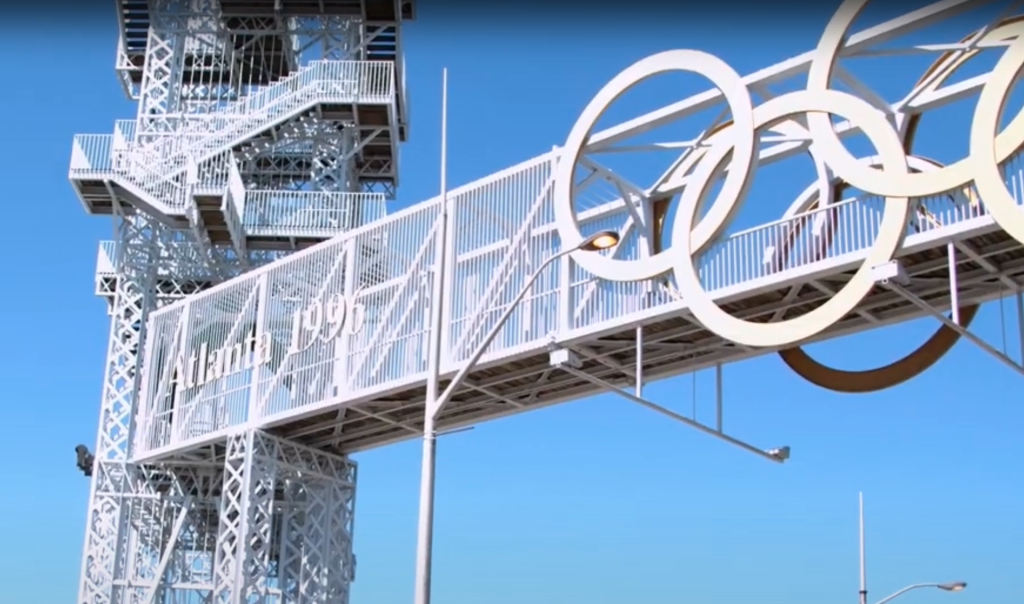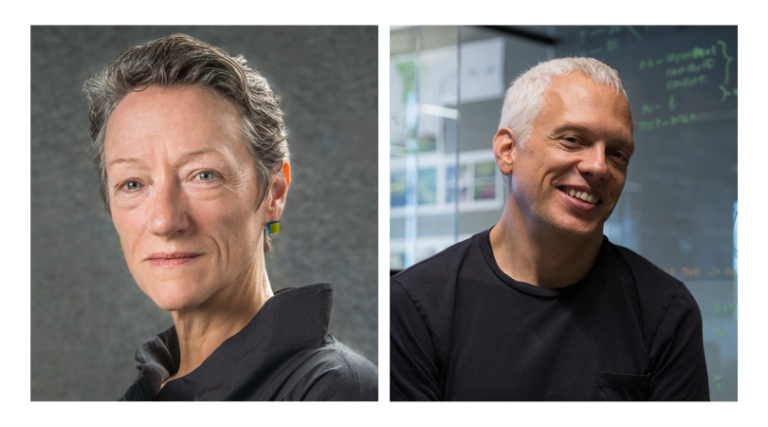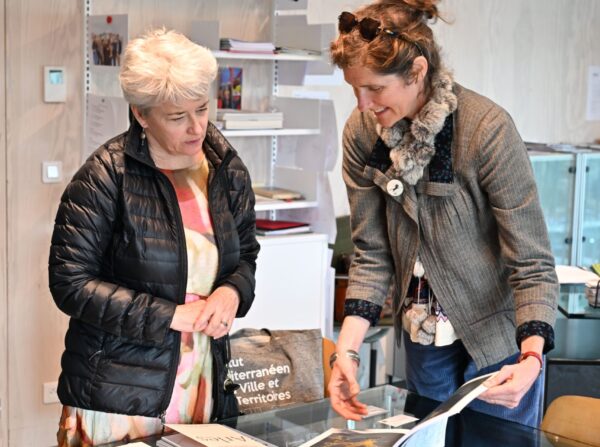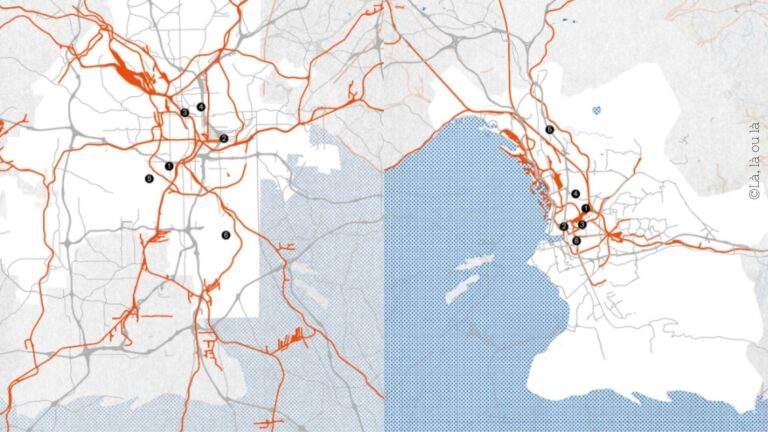
Urbanism, Olympism & Migrations
Conference
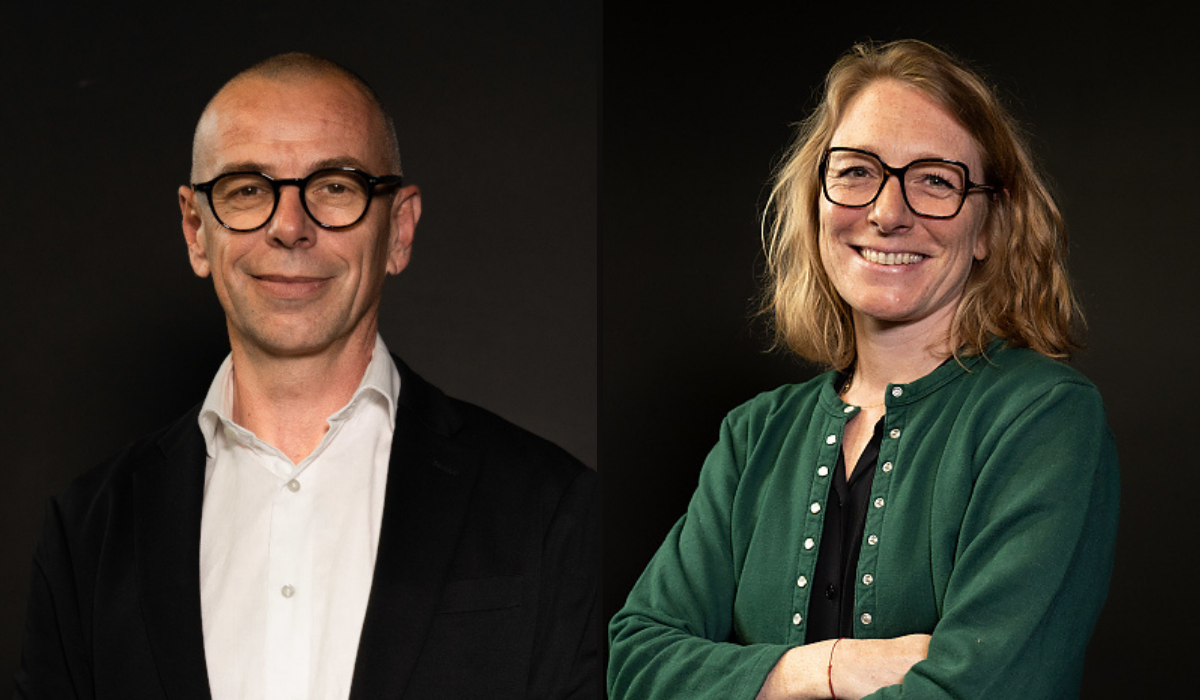
Atlanta
Atlanta, GA, US
October 26 - November 2, 2024
As part of City/Cité, Villa Albertine’s cooperation program on urban issues between the cities of Atlanta and Marseille, the Villa invites two historians from Aix Marseille University: Stéphane Mourlane and Céline Regnard. A few weeks after the end of the Paris 2024 Olympics and two years before the World Cup and the 30th anniversary of the 1996 Atlanta Olympics, these two historians will take part in a series of conferences on the legacy of the Olympic Games, Marseille and urban migration, in partnership with France-Atlanta, Atlanta Studies Network, Emory University & Georgia Tech.
After the Games: Development, Displacement, and Economic Legacies of the Olympics with Stéphane Mourlane, Mike Carnathan & Bem Joiner
Atlanta Studies Meetup | Tuesday, October 29 | 7-9pm
Manuel’s Tavern, 602 North Highland Avenue Northeast, Atlanta, GA 30307
Paris served as a stunning backdrop for the 2024 Olympics, showcasing a more sustainable approach by utilizing existing infrastructure for the Games. As Atlanta approaches the 30th anniversary of its 1996 Olympics, it prepares to once again host a major sporting event with World Cup matches in 2026. Since the first Olympic Games held in Athens in 1896, the event has required ever-increasing financial investment, having a growing impact on the host cities and their residents. Host cities have built sports facilities that were often architecturally spectacular, but of uncertain use after the games in some cases. These cities have also carried out urban development projects, with varying social impacts depending on the population. More recently, the question of environmental impact has also become a concern.
Stéphane Mourlane, Associate Professor in Modern History at Aix-Marseille University, will speak to the Paris example and provide a few historical examples which raise the question of the benefits of the Olympic Games for host cities.
Mike Carnathan, Manager of the Research & Analytics Department at the Atlanta Regional Commission, will present on the changing demographics of metro Atlanta since the Olympics and discuss some of the challenges we now face due, in part, to these changing demographics.
Bem Joiner will address the cultural effects of the 1996 Olympics on Atlanta. Bem is a culture curator and co-founder of the civic-minded creative consultancy/brand, Atlanta Influences Everything. He currently sits on the boards of four non-profits: Oakland Cemetery, The Wren’s Nest, The People United, and The Atlanta Land Trust.
This event is organized by the Atlanta Studies Network in partnership with Villa Albertine, at the invitation of Brennan Collins, Associate Director of Writing Across the Curriculum and the Center for Excellence in Teaching and Learning at Georgia State University. The Atlanta Studies Meetup meets quarterly to showcase Atlanta-focused projects and bring together a group of folks interested in our city.
Join us also for the following public lectures taking place at Emory University and Georgia Tech:
Olympic Games and Urban Transformation (1896 – 2024) with Stéphane Mourlane
Emory University Art History Department | Monday, October 28 | 6-7:30pm
Oxford Rd. Presentation Room at Emory University, 1390 Oxford Road NE, Atlanta, GA 30322
During the 2024 Olympic and Paralympic Games, the city of Paris offered both a sumptuous field and backdrop for the sporting competitions. Bringing these competitions to the heart of the city has transformed the Games. At the same time, the Games have left a legacy for the host city. Since the first Olympic Games held in Athens in 1896, the event has gotten stronger and stronger, with ever-increasing financial investment, having a growing impact on the host cities and their residents. Host cities have built sports facilities that were often architecturally spectacular, but of uncertain use after the games in some cases. These cities have also carried out urban development projects, with varying social impacts depending on the population. More recently, the question of environmental impact has also become a concern. A few historical examples raise the question of the benefits of the Olympic Games for host cities.
This event is organized by the Art History Department at Emory University, in partnership with Villa Albertine, at the invitation of Dr. Christina Crawford, Professor of Architectural History at Emory University.
Immigration in Marseille: Urban Heritage and Issues of Postcolonial Design
Georgia Tech College of Design | Thursday, October 31 | 8-9:15am
Clary Theater, Bill More Student Success Center at Georgia Tech, 225 North Avenue NW, Atlanta, GA 30332
Marseille’s urban heritage has been shaped by successive waves of migration over the past two centuries. This conference will highlight some of the places and neighborhoods that are emblematic of this migratory history, as well as the issues related to this heritage from a postcolonial perspective.
This event is organized by the College of Design at Georgia Tech, in partnership with Villa Albertine, at the invitation of Dr. Elisa Dainese, Assistant Professor of History and Theory of Architecture; Dr. Sonit Bafna, Associate Professor of Architecture; and Dr. Elora Raymond, Associate Professor of City & Regional Planning.
Postcolonial Issues in Marseille from 1960s to the Present Day with Céline Regnard
Emory University Department of French and Italian | Friday, November 1 | 2:45-4:00pm
C101, Callaway Memorial Center, 537 Kilgo Circle, Atlanta, Georgia 30322
The aim of this lecture is to present the main post-colonial issues in Marseille from the 1960s to the present day. After providing some background on French colonial history and Marseille’s place in it, Professor Regnard will discuss the issues and debates in Marseille linked to the history of slavery, colonization and immigration in the city.
This event is organized by the Department of French and Italian at Emory University, in partnership with Villa Albertine, at the invitation of professors Valérie Loichot, Eric Bulakites, and Noelle Giguere.
This event series is part of City/Cité Atlanta x Marseille, Villa Albertine’s transatlantic cooperation and exchange program on urban issues and city making. Launched in 2022, exchanges between these two cities notably explore the fertile relationships between culture and ecology, as well as urban policy and communities, and their ability to transform the way we make cities.
Stéphane Mourlane, PhD, is a lecturer in modern history at Aix-Marseille University (France). A researcher at TELEMMe, he is the deputy director of the Mediterranean Institute of Social and Human Sciences. His research focuses on the history of migration and the history of sports. He recently co-edited the Atlas of Migrations in the Mediterranean from Antiquity to the Present (2021), Marseille the Italian. Stories of a Centuries-Old Passion (2021), Italianness and Migration from the Risorgimento to the 1960s (2022), A Global History of Olympism (2023), and Olympism: A History of the World (2024). For the Paris 2024 Olympic and Paralympic Games, he co-curated a major exhibition on the history of Olympism (Palais de la Porte Dorée, April 26 – September 8).
Céline Regnard is a professor of modern history at Aix-Marseille University and a member of the TELEMMe research unit. She is a specialist in the social history of Marseille, the history of international migrations, and the global history of the 19th to 20th centuries. She has notably published ‘Italian Imprints. Marseille and its Region 1840-1940’ (with S. Mourlane), Lyon, Lieux Dits, 2013; ‘Policing Mobility in Europe and the United States from the 18th Century to the Present’ (with A. Conchon and L. Montel), Paris, Éditions de la Sorbonne, 2018; ‘Italianness and Migration from the Risorgimento to the 1960s’ (with S. Mourlane, C. Brice, and M. Martini), London, Palgrave Macmillan, 2022; and more recently ‘In Transit. Syrians in Beirut, Marseille, Le Havre, New York (1880-1914)’, Paris, Anamosa, 2022. She is currently leading two research projects: ‘MarsImperium. History and Memory of (Post)Colonial Marseille 19th-20th Century’ and ‘GlobalMed. The Mediterranean and the World from Prehistory to the Present, Interdisciplinary and International Approaches.’
